Congratulations on your new guinea pig
We are so glad you have made the decision to adopt a cat from Animal Aid!
If you are having any problems or have any questions please contact the shelter as soon as you can.
Coldstream
35 Killara Road Coldstream
03 9739 0300
enquiries@animalaid.org.au
Animal Aid Gippsland (Sale)
111 Hopkins Road Fulham
03 5144 5940
aag@animalaid.org.au
Animal Aid East Gippsland (Bairnsdale)
40 Giles Road Bairnsdale
03 5152 1389
aaeg@animalaid.org.au
Guinea pigs are great, low maintenance pets, but they do have some specific requirements and occasionally require veterinary care just like any other animal. To settle in your new furry family member:
- First day or two: your guinea pig will appreciate a quiet day to adjust to his/her new home.
- First few weeks: your guinea pig may want to run and hide, but some veggies and a gentle talking voice will help them get used to your company.
- Remember: guinea pigs are timid by nature and should be approached slowly and with quiet voices.
HANDLING TIPS
- Guinea pigs are gentle animals with delicate bones, so always handle with care.
- To pick up your guinea pig, slowly place one hand under his/her chest just behind the front legs and gently cup your other hand under the hind-quarters. Once you have a firm but gentle grip, you can pick him/her up. Immediately hold your guinea pig close to your chest or lap so they feel safe and can’t jump or wriggle about.
- Always use a blanket while holding your guinea pig. This will help him/her stay calm and feel secure.
- Children should be supervised when handling a guinea pig and should never carry him/her around.
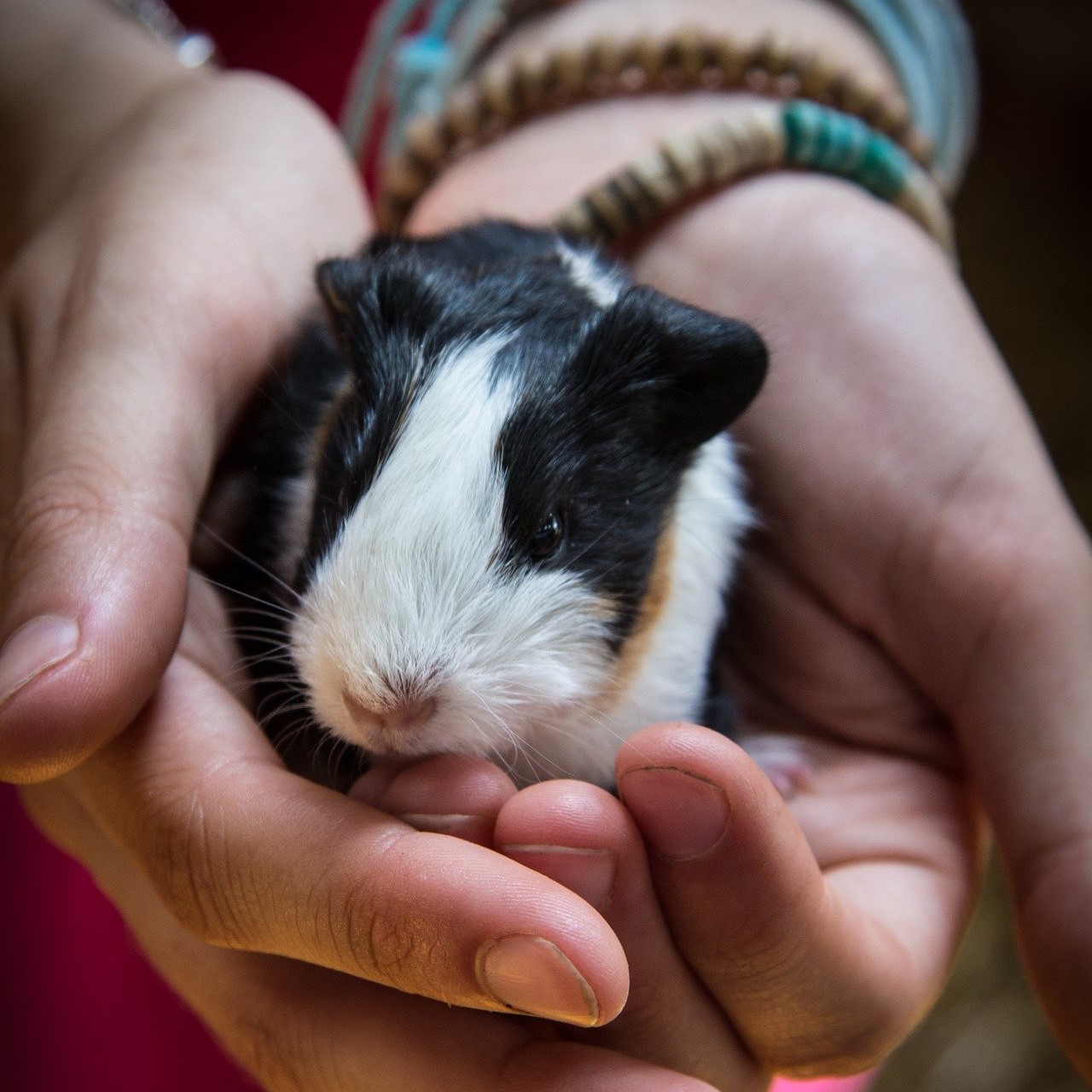
HOUSING & BEDDING
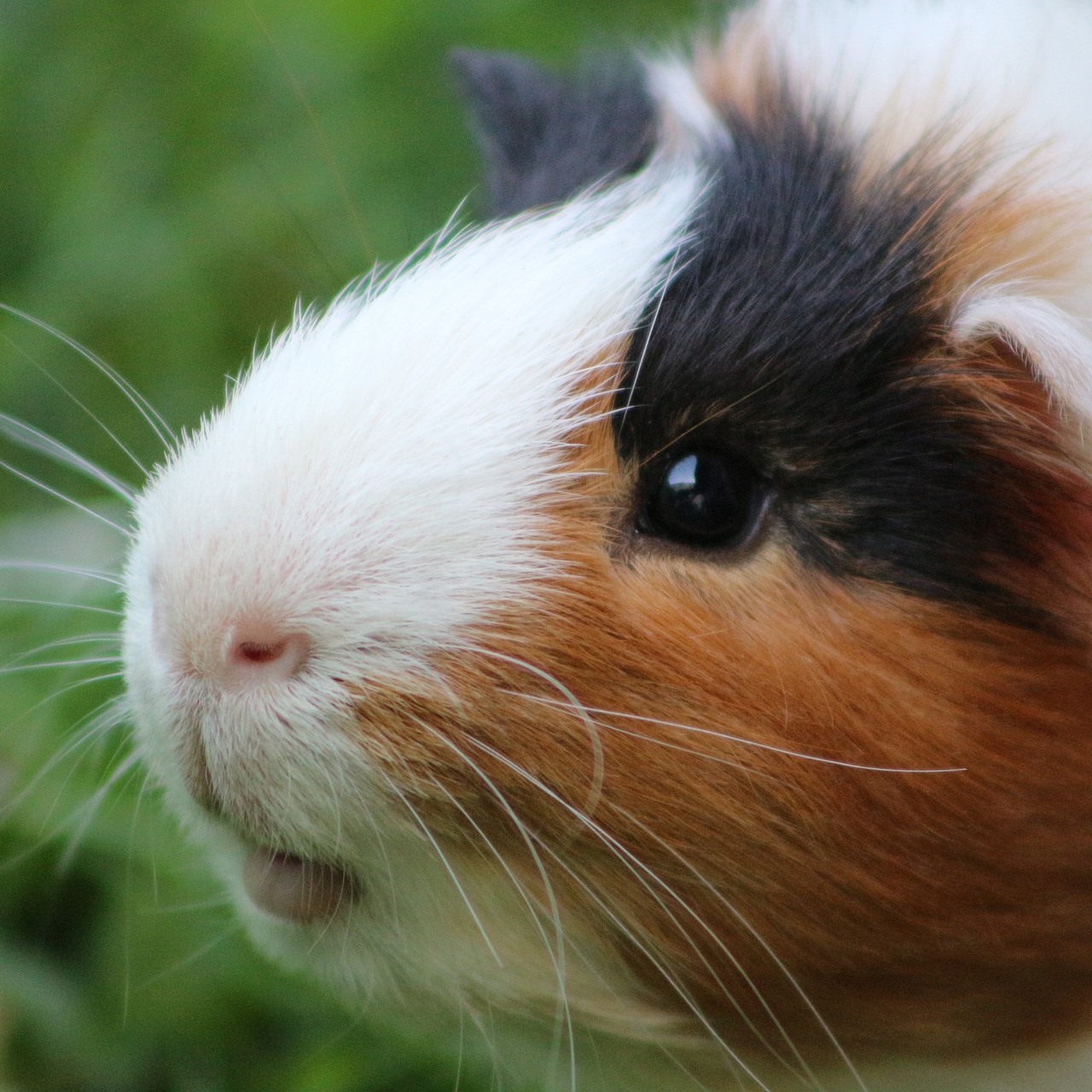
Guinea pigs need a secure cage safe from predators. Providing your guinea pig with a large and spacious environment promotes mental stimulation, increased exercise, ability to express natural behaviour and it is easier to clean.
The area that you provide must be as spacious as possible. A large cage is considered the healthiest way to house your guinea pig. One guinea pig needs at least 70 square centimetres of cage space. This is the minimum requirement that is needed for them to be healthy and happy.
Outdoor housing is not ideal nor in the best interests of your pet. There are numerous risks to housing guinea pigs outdoors such as temperature fluctuations, exposure to insects, predators, drafts, less social interaction, exposure to the elements and illness may not be detected promptly. Supervised outside time is okay in a wire hutch or wire pet pens. This helps with their mental stimulation and provides them with exercise and access to grass. If you are going out, it is advised that you return your guinea pigs to their indoor home for safety before your leave the house.
Guinea Pigs are very social and will be happier if housed with another guinea pig, but remember this doubles the amount of space that they will need in their cages. Guinea pigs have sensitive paw pads and need solid flooring. They cannot be housed in a wire-bottomed cage.
When guinea pigs are frightened, they either freeze in place or run away, and they prefer to have a hiding place in their cage. Plastic tubes and wooden or woven hay boxes are available in pet supply stores. A good, free alternative is using a cardboard box with the bottom cut out of it. Many guinea pigs love to chew on cardboard boxes and, while you may need to replace it regularly, this chewing will help keep their teeth worn down to a good length. Small pieces of untreated wood can also be provided to help satisfy your guinea pig’s need to chew and keep their teeth from getting overgrown as well.
Paper or pine bedding should be several inches thick and should be changed twice weekly. Grass hay is also good for bedding areas and they can chew on it as well, helping with the health of their teeth. Cedar shavings should not be used as bedding, as they contain phenols, which can be harmful to guinea pigs. Remove soiled bedding, droppings and stale food from the cage daily. Clean the cage completely once a week by replacing dirty bedding and scrubbing the bottom of the cage with warm water. Be sure everything’s dry before adding fresh bedding.
Make sure that your guinea pig doesn’t get overheated or chilled, as they are susceptible to both. If you need to venture out with your guinea pig in cold weather, make sure to cover the carrier with a warm blanket. On hot days, the car should be pre-cooled for them. Remember to never, ever leave your guinea pig unattended in a car for any reason even for just a few minutes, especially if it is a day of extreme temperatures.
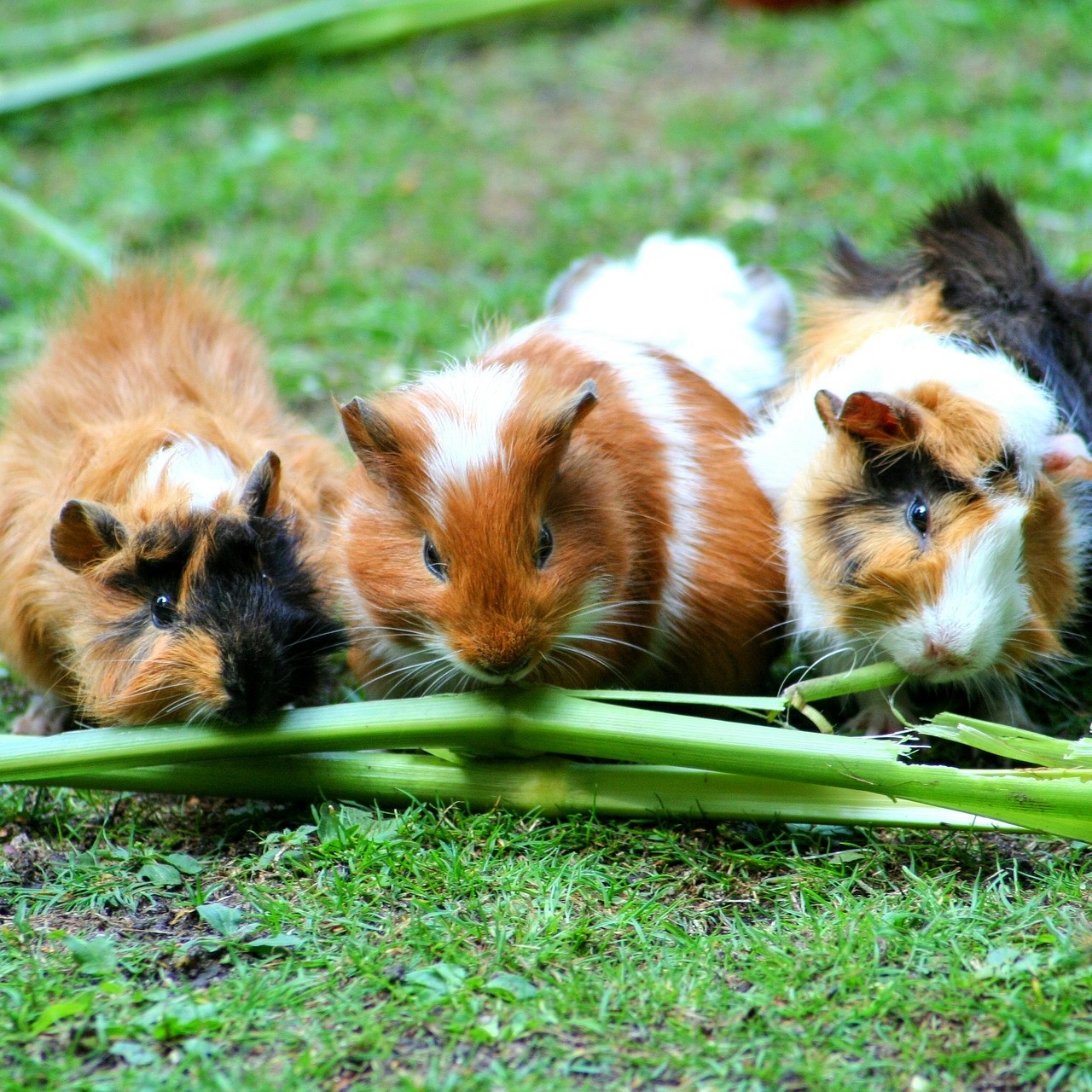
HEALTH NEEDS
When to visit the vet
We recommend annual health checks for your guinea pig. At this time your guinea pig will receive a thorough examination to help identify any problems that are occurring. There are no vaccinations available for guinea pigs in Australia, and as such, guinea pigs do not require annual vaccination. Your vet is there not only to heal your guinea pig when they are ill, but also to help keep them healthy and strong! Your vet can help ensure that your guinea pig’s teeth are wearing evenly, that his or her weight is appropriate, and that they are not showing any signs of disease or nutritional deficiencies.
Desexing
Your guinea pig has been desexed prior to leaving Animal Aid. Desexing is beneficial for the following reasons:
• Reducing the risk of fights occurring if you have more than one guinea pig.
• Decreasing aggression between boars.
• Prevents unwanted pregnancies.
• Prevents development of ovarian cysts in females – a common reproductive disease in female guinea pigs.
Diet and nutrition
You will need to feed your guinea pigs twice daily, in the morning and in the evening. Adult guinea pigs should have access to good quality grass hay at all times. It’s great for the digestive system, and will also satisfy your pet’s need to gnaw. Alfalfa and Lucerne hay is generally not recommended, as it can lead to obesity. Pellets are typically limited to help prevent obesity as well. Pet parents can offer fresh, clean greens to their guinea pigs daily diet.
We recommend offering small amounts of fresh fruit and vegetables to your guinea pigs every day, but shouldn’t make up more than 10% of your guinea pig’s diet. Try grapes, cucumbers, corn, peas, carrots and pears. Half a handful of veggies and a slice of fresh fruit per pig is plenty. Always make sure to clean up any leftover fresh food before it spoils. Handfuls of grass are also beneficial for your guinea pigs health; they can never have too much of it!
Unlike other animals, guinea pigs cannot manufacture Vitamin C, so you’ll need to ensure that your pets get enough of this essential nutrient every day. A quarter of an orange will do, but you can also include some fruits and veggies that are high in C to their daily ration of fresh foods, such as kale, capsicums, dandelion greens and strawberries.
It can often be difficult to change your guinea pig’s diet. It’s a good idea to expose young guinea pigs to a wide variety of foods, so that they will be more accepting of any changes in diet when they’re older.
Guinea pigs will also need a bottle with fresh, clean water to drink. The water should be changed daily, and the bottle should be thoroughly cleaned with hot, soapy water once a week to prevent algae formation.
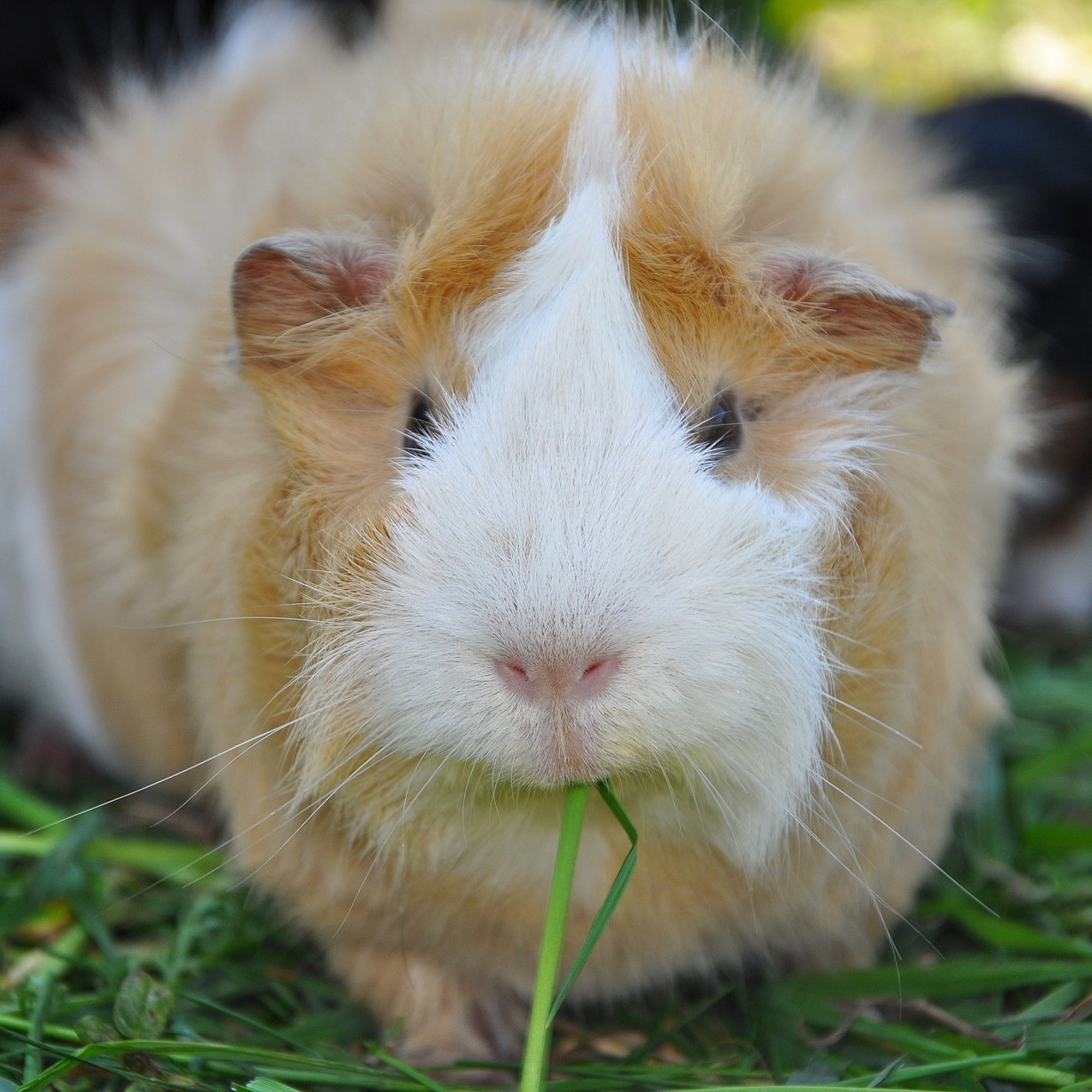
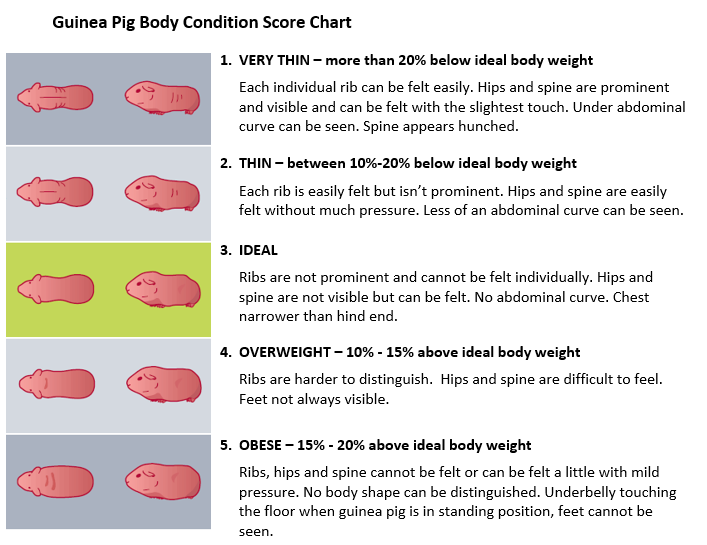
CARING FOR YOUR GUINEA PIG
It’s crucial that you get your pets used to you—and used to being handled. Start by feeding them small treats. When they’re comfortable with that, you can carefully pick up one pig at a time, one hand supporting the bottom, the other over the back.
Once you have hand-tamed your piggies, you should let them run around in a small room or enclosed area to get some additional exercise every day. You will need to carefully check the room for any openings from which the guinea pigs can escape, get lost and possibly end up hurt. These animals must be supervised when they are loose because they will chew on anything in their paths—including electrical wires. Guinea pigs like to hide and climb when playing.
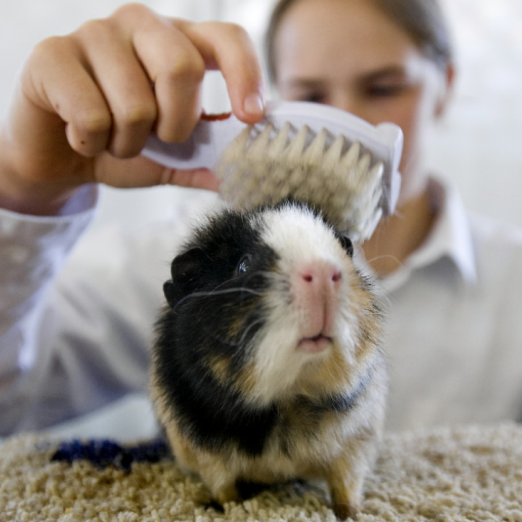
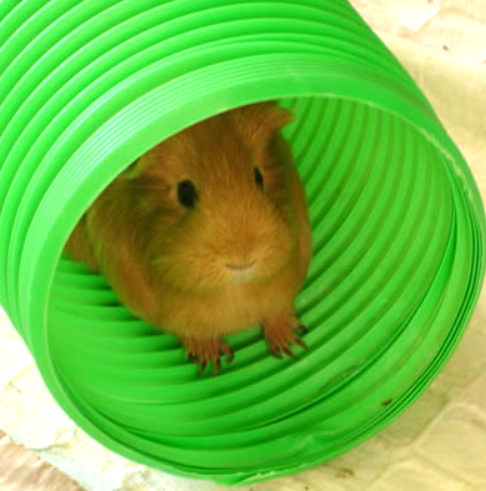
Cardboard tubes, PVC piping and/or flower pots are fun additions to their cage and exercise area.
Most guinea pigs require very little grooming. They can be brushed with a soft bristled baby brush every other week. There are a few breeds that have very long hair and can require more intensive grooming. Occasionally, a guinea pig will need a bath. You can bathe them with a mild pet shampoo and rinse with lots of warm water. Ask your vet to identify shampoo options that are safe for guinea pigs. Prevent chilling after the bath by keeping your guinea pig in warm towels until his/her fur is completely dry.
Guinea pigs will also need to have their nails trimmed. Typically trimming 1-2 times a month with a small cat nail trimmer will keep the nails at a good length.
Please get in touch if there is any way we can assist you with your new pet
We are so glad you have made the decision to adopt a cat from Animal Aid!
If you are having any problems or have any questions please contact the shelter as soon as you can.
Coldstream
35 Killara Road Coldstream
03 9739 0300
enquiries@animalaid.org.au
Animal Aid Gippsland (Sale)
111 Hopkins Road Fulham
03 5144 5940
aag@animalaid.org.au
Animal Aid East Gippsland (Bairnsdale)
40 Giles Road Bairnsdale
03 5152 1389
aaeg@animalaid.org.au




